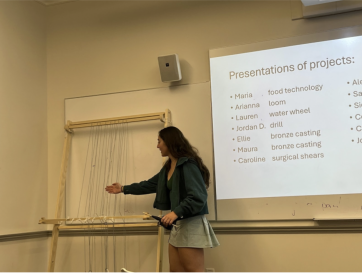
My Favorite Spring Class
Dartmouth has a set of classes that students take in order to fulfill their Distributive and World Culture Requirements. Shown below, there are about 12 different classes students must take to fulfill their requirements, though the World Culture Requirement can be overlapped with the Distributive Requirement, meaning that students can take 9 classes to fulfill all of these requirements.
By this spring, I had fulfilled all of them except the Technology or Applied Science; without lab (TAS) requirement. When I saw that the Classics Department was offeringing a class for that distributive, I immediately signed up (you can overlap the Distributive Requirements with your majors and minors)!
Classics 12.02: Greek and Roman Engineering and Technology obviously fulfilled the TAS requirement because the class's entire focus was on how the Greeks and Romans built different weapons, bridges, buildings, and even jewelry without the advanced machinery we rely on nowadays.
Every week, our professor would introduce a new topic, and a student would present on a niche area of the topic. For the "tools" week, I presented on medical tools! This allowed me to both deep-dive a topic that related to my career interests as well as buff up on my public speaking skills.
For the class's final project, students were tasked with building something the Romans would have used. I decided to assemble a pair of surgical shears that would have been used in surgery. Though the final product looks simple, it actually took a lot of time in Dartmouth's Donald Claflin Jewelry Studio because I built it the way the Romans would have without advanced technology.
Overall, I am really glad Dartmouth's Distributive Requirements allowed me to explore outside of my comfort zone in an engineering class. This class really made me appreciate the engineering prowess of the Greeks and Romans!


















